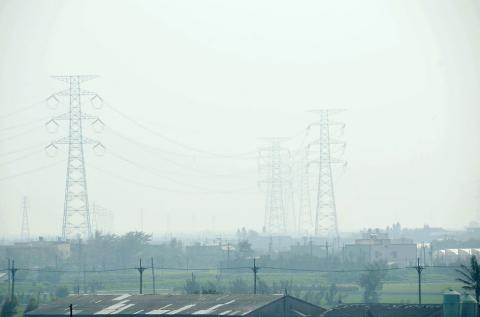Central Taiwan might be designated a top-grade air pollution control zone, while a Taichung City bylaw aiming to limit coal burning to curb air pollution might be approved by the central government next week, the Environmental Protection Administration (EPA) said.
At a meeting of the legislature’s Social Welfare and Environmental Hygiene Committee yesterday, EPA Minister Wei Kuo-yen (魏國彥) said that by the end of this year, Taichung, Changhua and Nantou might be designated as class-three air pollution control zones, where pollution is most severe according to the agency’s three-class categorization system.
The area was identified for potential designation as a class-three zone due to high concentrations of PM2.5 — fine particulate matter measuring 2.5 micrometers or less in diameter — Wei said, in response to New Power Party Legislator Hung Tzu-yung’s (洪慈庸) questions about an emissions cap in the area to curb pollution.

Photo: CNA
An area where air quality levels fall below the standard for three consecutive years can be recognized as a class-three air pollution zone, in which stricter standards apply to reduce emissions in the area.
According to an analysis of PM2.5 data collected in the past three years and announced by the EPA earlier this year, the whole nation, excluding Hualien and Taitung, qualify for class-three zone recognition.
Hung also asked whether the EPA would reject a Taichung bylaw to ban petroleum coke and reduce the use of coal in the city by 40 percent in four years, as the agency last year rejected a similar Yunlin bylaw that aimed to ban coal burning.
The EPA said the ban was beyond the county’s jurisdiction.
“The Taichung bylaw and Yunlin bylaw are different in content. The Taichung bylaw is less in conflict with central government laws and is likely to be approved. The EPA will submit an analysis of the Taichung bylaw to the Executive Yuan for review next week,” Wei said.
In related news, Democratic Progressive Party Legislator Liu Chien-kuo (劉建國) said participants of religious activities are at higher risk of PM2.5 exposure, as PM2.5 levels inside a temple that burns incense and ghost money could be three times higher than the highest level of the EPA’s 10-level PM2.5 index.
As a series of festivals celebrating Matsu are scheduled to begin soon, Liu called on the EPA to dispatch air quality monitoring vehicles to join religious processions and announce real-time pollution data and associated health risks of different religious activities, such as letting off firecrackers and burning incense.
“According to an EPA study, incense emits 75 to 700 micrograms of PM2.5 per cubic meter, which is 10 times higher than the highest level of the EPA’s PM2.5 index. I will personally join the processions and monitor air quality with a handheld device,” Wei said.

Right-wing political scientist Laura Fernandez on Sunday won Costa Rica’s presidential election by a landslide, after promising to crack down on rising violence linked to the cocaine trade. Fernandez’s nearest rival, economist Alvaro Ramos, conceded defeat as results showed the ruling party far exceeding the threshold of 40 percent needed to avoid a runoff. With 94 percent of polling stations counted, the political heir of outgoing Costa Rican President Rodrigo Chaves had captured 48.3 percent of the vote compared with Ramos’ 33.4 percent, the Supreme Electoral Tribunal said. As soon as the first results were announced, members of Fernandez’s Sovereign People’s Party

MORE RESPONSIBILITY: Draftees would be expected to fight alongside professional soldiers, likely requiring the transformation of some training brigades into combat units The armed forces are to start incorporating new conscripts into combined arms brigades this year to enhance combat readiness, the Executive Yuan’s latest policy report said. The new policy would affect Taiwanese men entering the military for their compulsory service, which was extended to one year under reforms by then-president Tsai Ing-wen (蔡英文) in 2022. The conscripts would be trained to operate machine guns, uncrewed aerial vehicles, anti-tank guided missile launchers and Stinger air defense systems, the report said, adding that the basic training would be lengthened to eight weeks. After basic training, conscripts would be sorted into infantry battalions that would take

GROWING AMBITIONS: The scale and tempo of the operations show that the Strait has become the core theater for China to expand its security interests, the report said Chinese military aircraft incursions around Taiwan have surged nearly 15-fold over the past five years, according to a report released yesterday by the Democratic Progressive Party’s (DPP) Department of China Affairs. Sorties in the Taiwan Strait were previously irregular, totaling 380 in 2020, but have since evolved into routine operations, the report showed. “This demonstrates that the Taiwan Strait has become both the starting point and testing ground for Beijing’s expansionist ambitions,” it said. Driven by military expansionism, China is systematically pursuing actions aimed at altering the regional “status quo,” the department said, adding that Taiwan represents the most critical link in China’s

‘REALLY PROUD’: Nvidia would not be possible without Taiwan, Huang said, adding that TSMC would be increasing its capacity by 100 percent Nvidia Corp CEO Jensen Huang (黃仁勳) on Saturday praised and lightly cajoled his major Taiwanese suppliers to produce more to help power strong demand for artificial intelligence (AI), capping a visit to the country of his birth, where he has been mobbed by adoring fans at every step. Speaking at an impromptu press conference in the rain outside a Taipei restaurant, where he had hosted suppliers for a “trillion-dollar dinner,” named after the market capitalization of those firms attending, Huang said this would be another good year for business. “TSMC needs to work very hard this year because I need a lot